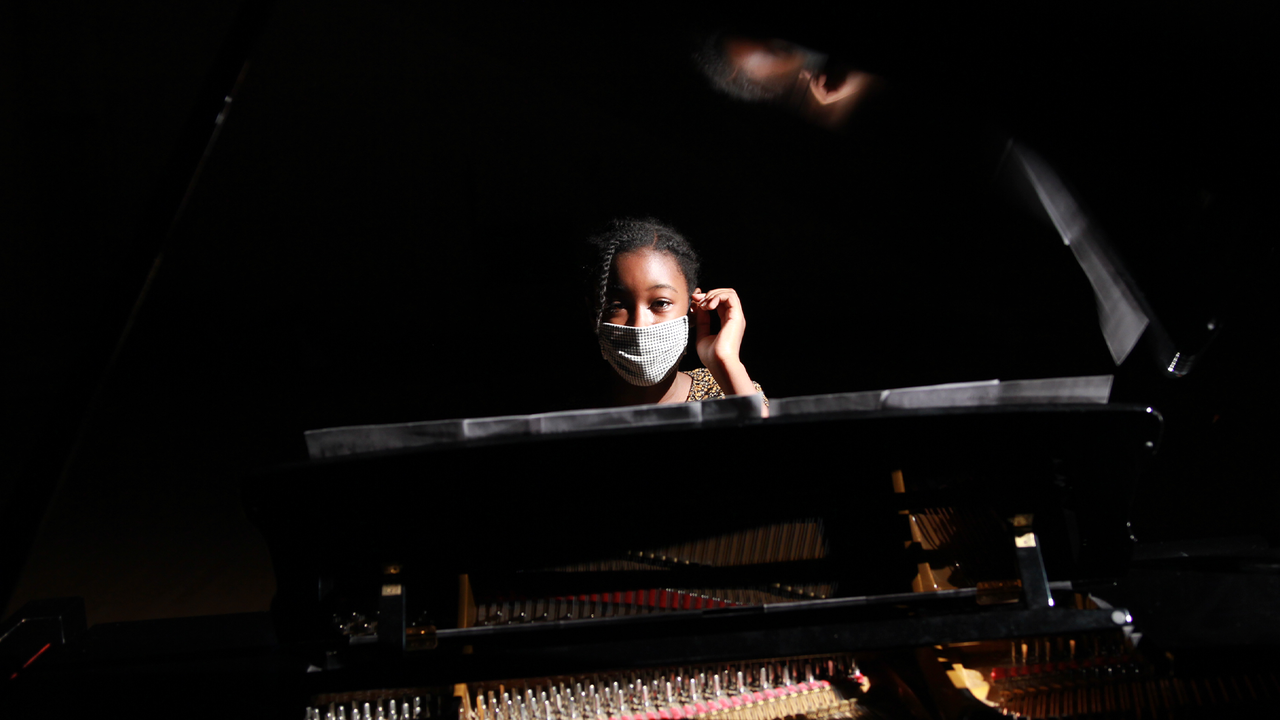 By Aramide Tinubu ·June 17, 2021June 16, 2021
By Aramide Tinubu ·June 17, 2021June 16, 2021
Cinema has returned to New York City full force with the 20th annual Tribeca Film Festival. While movie-watching from home certainly has its advantages, the Tribeca Film Festival’s triumphant return with in-person programming is a turning point for the film community and movie lovers everywhere.
Founded by Robert De Niro, Jane Rosenthal, and Craig Hatkoff the year after the 9/11 terror attacks rocked the city, 20 years later, Tribeca is serving as a place of communion as the city emerges from a year of uncertainty, isolation, and confusion. Though the festival is typically held in April, this year it’s running from June 9-June 20 with Juneteenth programming that celebrates and recognizes Black talent in front of and behind the screen with in-person and virtual viewing options.
For the third year, Queen Latifah, in partnership with Procter & Gamble and Tribeca Studios, has opened the door for a new generation of Black women documentary filmmakers with their The Queen’s Collective Shorts initiative. Through the initiative, four winners were handpicked to receive mentorship, education, funding, distribution, media opportunities, and other forms of support for their short-form projects. This year Arielle Knight’s A Song of Grace, Tanya DePass’ Game Changer, Cai Thomas’ Change the Name, and Hairy Assefa’s Black Birth all make their debut.
 A Song of Grace
A Song of Grace
A Song of Grace tells the story of a Black mother raising an exceptional Black artist. Game Changer is about DePass’s quest to make gaming more inclusive. Change the Name follows student activists and educators’ campaign to change the name of a park on the predominantly Black West Side of Chicago to abolitionists Anna Murray and Frederick Douglass. Finally, Assefa’s Black Birth navigates the complexities of Black motherhood and birth amid a global pandemic.
“I’ve been reading and thinking about Black maternal health for a couple of years now,” Assefa told ESSENCE. “And it’s incredibly concerning. The numbers are unacceptable. Black women are two to three times more likely to die of pregnancy-related causes than white women. That’s always been heavy, but when I became pregnant last year with my first child, it hit home in an even deeper way. It’s a lot to balance, to be holding this joy and excitement and be growing life inside of you, but also at the same time having to reconcile with the reality of what that could mean when giving birth as a Black woman in this country.”
 Black Birth
Black Birth
Creating Black Birth while preparing to bring life into the world was not something Assefa could have ever imagined, but the Queen’s Collective was there to anchor her the entire way. “The Queen Collective has been an invaluable resource during this time,” she explained. “That mentorship was huge. I think making a film when you’re pregnant is probably challenging in most situations, but I found it to be really empowering. My big hope, first and foremost, is that Black women and Black mothers get to see it. It’s my love letter to black mothers and black motherhood. I hope that it shows the nuances and the fullness of our experience.”
In addition to the Queen’s Collective documentary shorts, the 8:46 Films program celebrates Black joy while remembering the life of George Floyd. Produced by Saturday Morning, Procter & Gamble, and Tribeca Studios, 8:46 Films presents four narrative shorts this year — 8 minutes and 46 seconds long —about Black joy.
This year, the 8:46 collection includes Camrus Johnson’s animated short, She Dreams at Sunrise, about an older Black woman escaping her mundane life through her dreams. Marshall Tyler’s Slow Pulse follows a Black man’s desire to heal and find hope through dance. Zoey Martinson’s heartfelt comedy Cupids centers on three kids who want to find a love match for their beloved school bus driver. Then there is Gibrey Allen’s wistful Pearl and Henry, about an older couple finding joy and comfort in their everyday routine.
 Slow Pulse
Slow Pulse
“I was honored to be included in P&G’s efforts to Widen the Screen,” Martinson told ESSENCE. “To tell a story of joy and love, inspired by a man whose life inspired a movement, felt like the healing I needed as a Black artist. My work centers comedy as a method of connection and unifying our humanity across borders. It constantly reminds me to keep moving forward and change is inevitable.”
In addition to Queen’s Collective and 8:46, Emmy Award-winning writer, creator, and actor Lena Waithe and her production company Hillman Grad have teamed up with mentors Ventureland and PRETTYBIRD filmmakers for Indeed Presents Rising Voices. This year 10 shorts from 10 Black, Indigenous, and people of color (BIPOC) filmmaker teams are being presented at the festival. They include Johnson Cheng, David Fortune, Stacy Pascal Gaspard, Deondray & Quincy LeNear Gossfield, Kantú Lentz, Boma Iluma, Gabriela Ortega, Dre Ryan, Elisee Junior St. Preux, Shelly Yo.
“Rising Voices not only provided BIPOC filmmakers an opportunity to share our stories, but it empowered us to present our communities as champions, survivors, and resilient groups of people,” Fortune told ESSENCE. “Considering where we were from last year to now, premiering at the Tribeca Film Festival is a dream beyond imagining.”
 Cupids
Cupids
Additionally, Tribeca will present The Harry Belafonte Voices For Social Justice Inaugural Award to Civil Rights activist Stacey Abrams while launching their Juneteenth Programming. This programming consists of the aforementioned shorts programs and features, additional shorts, and immersive programming.
The Tribeca Film Festival Juneteenth slate includes Jamila Wignot’s Ailey, which ESSENCE covered at Sundance this year. The documentary film centers on the life and legacy of iconic dancer and choreographer Alvin Ailey.
Co-directors Taylor Garron and Chanel James’ as of yet, is a dramedy about a young Black woman who ponders breaking NYC’s quarantine rules to meet the man of her dreams.
In The Legend of the Underground, Nneka Onuorah and Giselle Bailey explore rampant homophobia and discrimination in Nigeria while following several non-conformist youths fighting for life and freedom.
In The Sit-In: Harry Belafonte Hosts the Tonight Show, Yoruba Richen examines the one week in 1968, amid a racially volatile America when the legendary Harry Belafonte guest-hosted The Tonight Show for Johnny Carson.
In Queen of Glory, writer, director, and star Nana Mensah stars as Sarah, a doctoral student at Columbia University who must deal with the unexpected death of her mother and the beloved Christian bookstore that has been left to her.
Maya Cozier’s Trinidad and Tobago-based She Paradise follows Sparkle (Odessa Nestor), a naive 17-year-old who gets caught up in the glitz, glamour, and chaos of a popular dance crew.
In Stateless, Michèle Stephenson explores the Dominican Republic’s history of anti-Blackness and the complex history and present-day politics of Haiti and the Dominican Republic.
Finally, Loira Limbal’s documentary feature, Through the Night, follows a woman named Nunu, the primary caregiver at a 24-hour daycare center in Westchester, New York, and the families she pulls into her heart and home.
Other notable feature-length films include Untitled: Dave Chappelle Documentary by Steve Bognar and Julia Reichert, Sacha Jenkins’ Bitchin’: The Sound and Fury of Rick James, Charles Todd, Devin Amar, and Matt Mitchener’s profile on Chicago blues great Buddy Guy in Buddy Guy: The Blues Chase the Blues Away, John Maggio’s A Choice of Weapons: Inspired by Gordon Parks, Sol Guy’s: The Death of My Two Fathers, Mobolaji Olambiwonnu’s Ferguson Rises, CJ Hunt’s The Neutral Ground, Delmar Washington’s No Running, Andre Gaines’ The and Only Dick Gregory, The Architects, Stockholm Syndrome, Muta’Ali’s Yusuf Hawkins’ Storm Over Brooklyn and Ty Hodges’s Venus as a Boy.
In addition to these films and the shorts from the 8:46 and Queen’s Collective programs, as well as several immersive installations at various locations throughout NYC, Louis Bryant III, and AmaYah Harrison’s 19 Seventy Free, Aisha Ford’s Cherry Lemonade, Caleb Slain’s Enough, Tayo Amos’ Magnolia Bloom, TJ O’Grady Peyton’s Silence, and Agazi Desta’s Waves will also debut as a part of Tribeca’s Juneteenth programming.
TOPICS: Tribeca Film Festival
The post Tribeca Film Festival Creates Opportunities For Burgeoning Black Filmmakers appeared first on Essence.

0 Commentaires